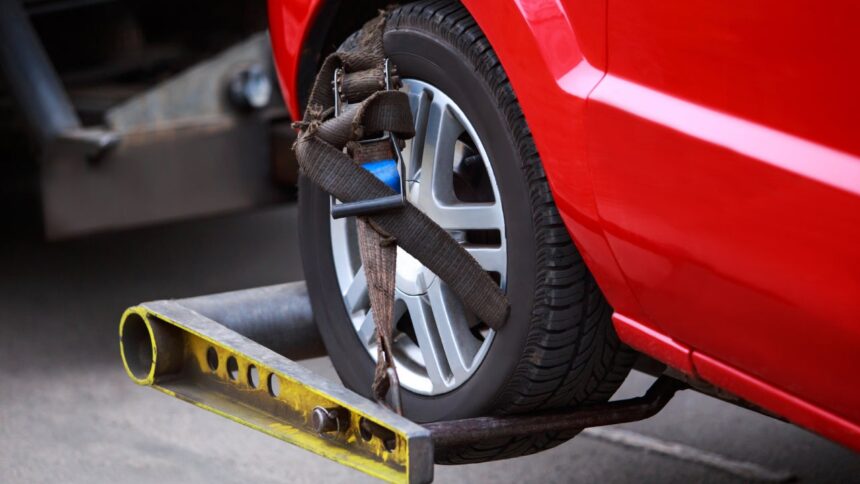Once you have covered the basics with car insurance (liability, collisions, comprehensive coverage), it’s time to consider the approvals you want to add. In addition to fully covered car insurance, towing and labor coverage is allowing drivers to claim costs for towing, fuel delivery and similar services when an insurance vehicle breaks down on the street.
What do towing and labor coverage include?
Towing and labor coverage are a type of approval of options that many insurers offer for fully covered auto insurance contracts. Like roadside assistance, towing and labor coverage can help offset the costs of towing trucks and other emergency assistance if the insured breaks down from home.
Towing and labor costs approvals may cover all or part of the following:
- towing
- Start jump
- Gas or oil delivery
- Change tires
- Lockout
- winch
- Personnel costs related to emergency road repairs
Coverage and restrictions may vary widely from company to company. It is worth noting that your collision or comprehensive insurance may include towing costs if your car is disabled due to a covered loss, but towing and labor compensation may address more situations where towing is needed.
How do towing and labor compensation restrictions work?
As to what towing or labor coverage covers may vary by carrier, different coverage restrictions may appear depending on the insurance company’s policy. Your insurance company may limit the following
- Amounts that could be refunded for towing and labor costs
- Number of times per year you can use your towing and labor compensation
- Miles to which towing coverage is applied
If you reach towing or labor compensation restrictions and experience additional costs or encounter another breakdown, you may need to pocket the costs of towing services or other emergency assistance or rely on traditional roadside assistance membership.
What do towing and labor compensation exclude?
“labor” in the name of towing and labor compensation emphasizes the fact that while it applies to repair work covered, it does not cover the cost of parts required for roadside repairs. In other words, if you blow the tires off the drive and don’t have a spare, you won’t be refunding the cost of the tires themselves. If you run out of gas, towing and labour compensation may pay someone for the time and labor needed to bring fuel to you, but you will pay for the gas.
Is it worth towing and labor compensation?
Towing and labor compensation may be valuable if:
- You drive an old car: If your vehicle is at an age where mechanical failures may be more likely, towing and labor compensation may be rewarded in emergencies.
- Your car insurance budget is flexible: Towing and labor compensation are usually cheap add-ons, so if you don’t mind paying a little more each month, it might be a good investment.
- You drive a lot: If you have lots of miles in your car for work or leisure, labor compensation in your tow and back pocket can help you prepare for an unexpected emergency.
Towing and labor compensation may be worthless if:
- You don’t want full coverage: Generally, comprehensive and conflict compensation should be required before adding towing and labor compensation to a policy. If you are stuck with a liability-only insurance policy, we recommend considering alternative options for roadside assistance.
- Additional benefits for Roadside Support Membership are required: Towing and labor compensation are practical and inexpensive, but their benefits are often rather sparse. Roadside support membership with organizations like the AAA usually costs more, but grants additional perks such as travel planning and discounts.
- You want to avoid the claim: Using towing and labor coverage constitutes claims regarding insurance contracts, which could lead to increased fees in the future.
If you are considering towing or labor coverage, you can also weigh the pros and cons of other complete coverage add-ons, such as car rental reimbursement insurance.
Towing and labor costs compensation for roadside support
The biggest difference between towing and labor coverage and roadside assistance is that the former is your auto insurance approval and link it directly to your insurance. That has its advantages. For example, coverage is often cheaper, but using coverage can increase your rates. Roadside assistance usually acts as another service that does not affect the rate, but can be more expensive.
| Towing and labor compensation | Roadside support | |
|---|---|---|
| What is it? | Optional approval for full coverage auto insurance | Paid services available through insurance companies, automakers and AAA |
| What is included? | Towing, jump start, fuel delivery, lockout, tire change, winch, Shane labor (depending on provider) | Towing, jump start, fuel delivery, lockout, tyre changes, winch, Shane labor, travel disruption benefits (depending on provider and membership level) |
| How much does it cost? | Usually it’s cheap to add | It ranges from cheap to expensive |
| Can it increase your premiums? | yes | no |
| Do you follow the car or driver? | Follow the car | Follow the driver |










